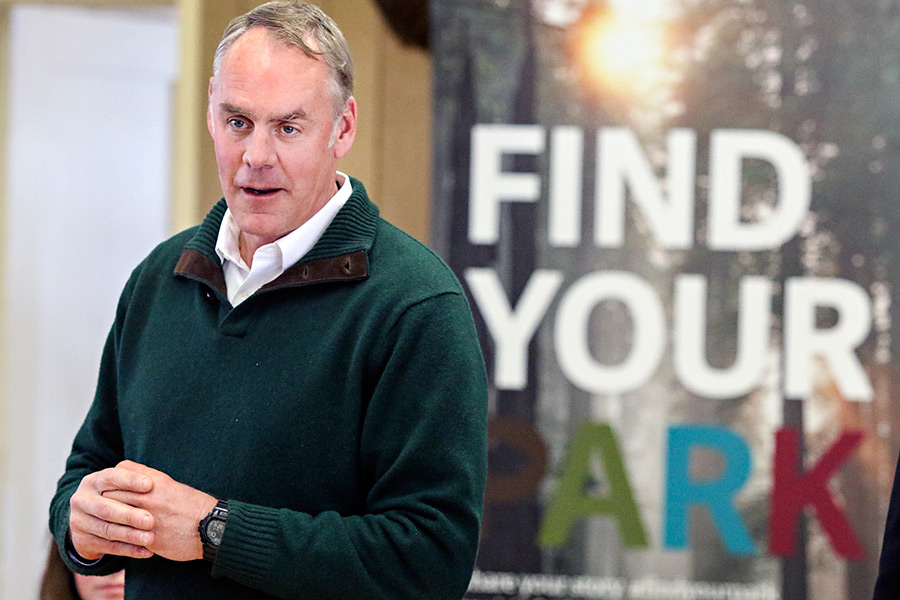Interior Secretary Ryan Zinke’s full-throated endorsement of the popular Land and Water Conservation Fund and his opposition to transferring ownership of public lands rang out sharply during his first term as a Republican Congressman from Montana, setting him apart from the pack as a representative who wasn’t easily cowed by party leaders.
“I’m starting to wonder how many times I have to tell these guys in party leadership I’m not going to allow Montana’s public lands to be sold or given away,” Zinke declared in 2016 after he emerged as the only House GOP member to vote against a bill that would have permitted 2 million acres of public land owned by the U.S. Forest Service to be transferred to state ownership.
The vote came just as the land-transfer movement was gaining ground in Western politics, with advocates successfully pushing it off the sidelines of fringe politics and inscribing it into the official GOP platform.
But Zinke wasn’t biting.
“Two million acres is a lot, even in Montana,” the Whitefish native continued. “That’s the Flathead National Forest, poof, gone. Lolo National Forest, gone. We use our land for hunting, fishing, hiking, and to create jobs. Our outdoor economy is a billion-dollar economic engine for the state that creates jobs. The federal government needs to do a much better job of managing our resources, but the sale or transfer of our land is an extreme proposal and I won’t tolerate it.”
At Zinke’s Senate confirmation hearing last year, the newly anointed cabinet appointee reiterated his stance while pledging continued support for permanently reauthorizing the Land and Water Conservation Fund (LWCF), which draws revenue from offshore oil and gas development to boost local projects in the nation’s parks, wildlife refuges, forests, and trails.
“You have my full commitment,” Zinke said.
But President Donald Trump’s proposed budget for 2019 unveiled this week, which would slash funding for the massive department Zinke now helms while all but eliminating LWCF, has forced public-land advocates back on their heels as they point out the severe consequences the steep cuts could have in Montana and other Western states.
The proposed budget would cut LWCF to $8 million, down 98 percent from the $400 million earmarked in Fiscal Year 2017 and less than 1 percent of the maximum authorized annually under full funding, which is $900 million.
Even as Zinke says his support for popular land access programs like LWCF remains steadfast, the Trump administration’s budget request has drawn criticism from a host of influential conservation groups and elected leaders who worry the Interior Secretary’s support is eroding, and they’ve zeroed in on the proposed cuts as evidence that critical funding for air and water quality, which prop up Montana’s economy and are ingrained in its values, are in jeopardy.
Land Tawney, executive director for Backcountry Hunters and Anglers, was an early backer of Zinke’s appointment as Interior Secretary, and publicly expressed optimism that the native Montanan and self-professed Teddy Roosevelt acolyte would carry forward the land ethics he’d long espoused.
“So, why now is the administration throwing its support behind a measure that would eliminate funding for the LWCF and cripple the program’s ability to acquire new access, including access to currently inaccessible public lands and waters?” Tawney said. “You can’t claim that access is the name of the game, then gut the most successful, established, bipartisan public access program in existence. Sportsmen are sorely disappointed by this abrupt about face.”
Cuts to LWCF, which is set to expire Oct. 1 unless lawmakers reauthorize it, would nearly wipe out a program that was enacted by Congress in 1965, and which has since enjoyed strong bipartisan support.
Interior Spokesperson Heather Swift this week said, “The Secretary’s position is unchanged” on LWCF.
Still, the looming cuts have left public-land advocates scratching their heads and summoning Zinke’s checkered voting history as a congressman and his support for aggressive energy-exploration policies under an industry-friendly administration as more than enough reason for concern. It’s also left business-minded environmentalists wondering what’s in store for the future of a state whose outdoor economy generates $2.2 billion in wages and salaries, $7.1 billion in consumer spending, $286 million in state and local tax revenue, and supports 71,000 jobs, according to a recent Outdoor Industry Association report.
“It creates uncertainty for businesses when leaders in Washington say one thing and do the other,” Marne Hayes, executive director for Business for Montana’s Outdoors, said. “You cannot say that you support a program and then turn on the same program and support slashing it to a skeleton of what it once was.”
In January 2017, U.S. Sen. Jon Tester, D-Montana, introduced Zinke at his confirmation hearing in front of the Senate Energy and Natural Resources Committee, calling the Secretary’s job critically important, “especially as America’s public lands come under attack.”
Tester, who is a cosponsor on a piece of legislation to permanently reauthorize and fully fund LWCF, urged the committee to ask Zinke questions about “how he will push back on this administration, with his perspective, whenever necessary.”
“If he provides you with the answers he has provided to me, I expect you will find that he is equipped to hold this post with accountability,” Tester said.
Zinke answered the questions with aplomb and confidence, affirming his allegiance to America’s public lands. But Tester said Trump’s proposed budget cuts run counter to the values the Secretary has pledged to uphold.
“The Land and Water Conservation Fund has opened up access to thousands of acres of public land in Montana. These attacks on our Western way of life would have Teddy Roosevelt rolling over in his grave,” Tester said. “You can put on your waders, rig up your rod, head into the water and call yourself a conservationist, but actions speak louder than words. We need to fully fund LWCF — not decimate it.”
